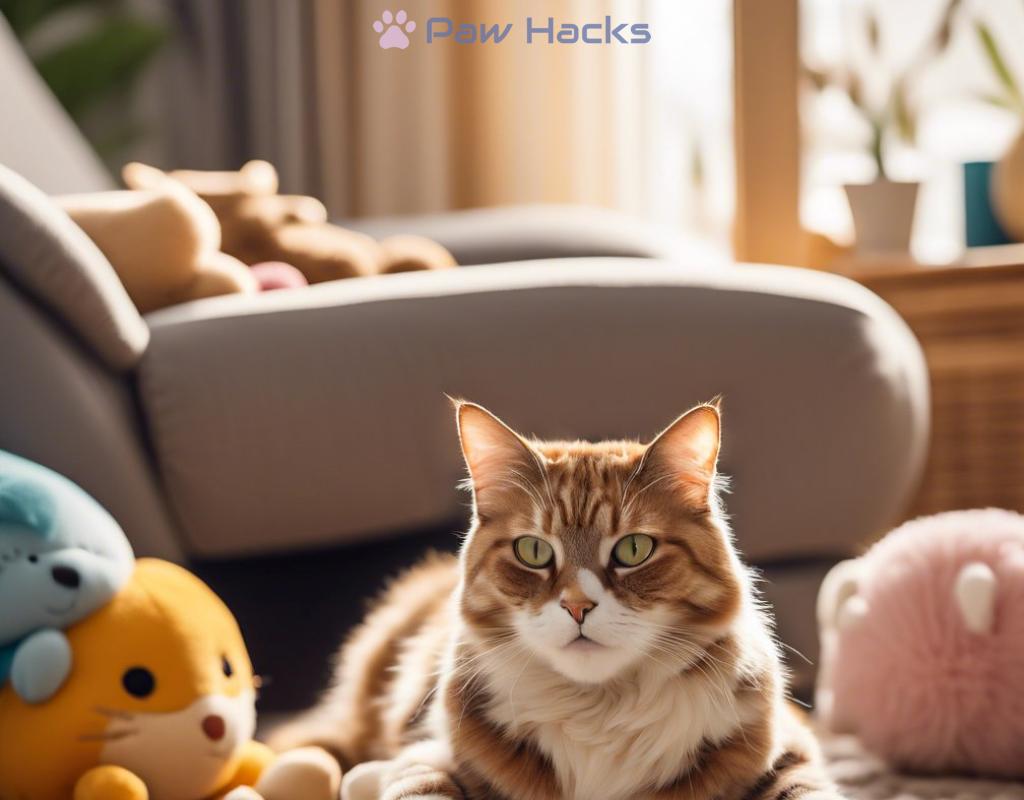Feline Cognitive Dysfunction Management
Understanding Feline Cognitive Dysfunction: Signs and Symptoms

As our feline friends age, they can experience changes in their behavior and cognitive abilities, much like humans. Feline Cognitive Dysfunction (FCD) is a condition that affects older cats, leading to a decline in mental function. Understanding the signs and symptoms of FCD is crucial for early intervention and management. In this article, we will explore the various indicators that may suggest your cat is experiencing cognitive decline.
Feline Cognitive Dysfunction manifests in several ways. It’s important to monitor your cat’s behavior closely, as early detection can lead to effective management strategies. Below is a list of common symptoms associated with FCD:
- Disorientation: Cats may seem confused, wandering aimlessly or getting stuck in corners.
- Changes in Sleep Patterns: Increased nighttime activity or excessive sleeping during the day can indicate cognitive issues.
- Altered Interactions: Affected cats may become more aloof or display increased clinginess.
- Inappropriate Elimination: A sudden change in litter box habits can be a sign of cognitive dysfunction.
- Decrease in Activity: A noticeable decline in playfulness or curiosity is often observed.
Feline Cognitive Dysfunction can significantly impact your cat’s quality of life. Not only does it affect their behavior, but it also places emotional strain on both the cat and its owner. Recognizing these symptoms early allows pet owners to seek veterinary advice and explore treatment options that can help slow the progression of the disease. Managing FCD often includes a combination of environmental enrichment, dietary changes, and possibly medication. Taking proactive steps can enhance your cat’s well-being and help them navigate their golden years with dignity.
Creating a Supportive Environment for Your Cat’s Mental Health
Creating a supportive environment for a cat experiencing Feline Cognitive Dysfunction (FCD) is essential for their mental health and overall well-being. A well-thought-out living space can significantly alleviate confusion and promote a sense of security. Start by minimizing clutter, as a tidy environment reduces potential sources of anxiety. Consider establishing a specific area in your home that is quiet and free from disturbances. Cats thrive in familiar surroundings, so keeping their favorite spots and possessions intact can provide them with comfort.
Engaging your cat in stimulating activities is crucial for maintaining their cognitive health. Activities such as interactive play, puzzle feeders, and safe climbing structures can help keep their mind active and engaged. Incorporating regular playtime into their daily routine can counteract the lethargy associated with FCD. Additionally, try rotating toys to keep their interest piqued; this small change can lead to a renewed curiosity in their environment. Remember, the goal is to provide mental challenges that are not overwhelming, so always pay attention to your cat’s reactions and adjust accordingly.
Routine is vital for cats with cognitive dysfunction. Maintaining a consistent feeding schedule and daily activities can help minimize confusion and anxiety. Cats are creatures of habit, and the predictability of their day can be a calming factor. Ensure that any changes to their environment are introduced gradually. This could mean moving their litter box slightly or changing where you place their food. Providing a stable and familiar environment is key to helping them cope with cognitive decline.
In conclusion, by enhancing your cat’s living space, engaging them with stimulating activities, and maintaining a routine, you can create a nurturing environment that supports their mental health. These steps not only improve their quality of life but also strengthen the bond you share with your feline companion. Remember, your attention and care can make a significant difference as your cat navigates the challenges of cognitive dysfunction.
Effective Treatment Options: Medications and Supplements
As pet owners witness the gradual changes in their beloved cats due to Feline Cognitive Dysfunction (FCD), exploring effective treatment options becomes essential. In addition to creating a supportive environment and maintaining routines, medications and supplements can play a crucial role in managing this condition. With a variety of treatments available, understanding the options can empower you to make informed decisions for your feline friend.
Veterinarians often recommend specific medications designed to improve cognitive function in cats suffering from FCD. One of the most commonly prescribed drugs is Selegiline, which works by increasing dopamine levels in the brain. This medication can help enhance your cat’s mood and cognitive function, potentially leading to improved behavior and engagement. It’s important to note that while some cats may respond positively to this treatment, others may not experience the same benefits.
Another option is Gabapentin, which can help manage anxiety and promote a sense of calm in cats. This medication is particularly beneficial for those experiencing stress due to cognitive decline. As with any medication, regular consultations with your veterinarian are vital to monitor your cat’s response and adjust dosages as necessary.
In addition to prescription medications, various supplements can support mental health in cats with FCD. Omega-3 fatty acids, for instance, are known for their anti-inflammatory properties and role in promoting brain health. Incorporating omega-3 supplements into your cat’s diet may help improve cognitive function and slow the progression of dysfunction.
Another promising supplement is Antioxidants, which combat oxidative stress in the brain. Ingredients like Vitamin E and Coenzyme Q10 can be found in many commercial cat foods or as standalone supplements. These antioxidants help protect brain cells from damage, offering a potential boost in cognitive performance.
| Medication/Supplement | Primary Benefit | Notes |
|---|---|---|
| Selegiline | Increases dopamine levels | Consult vet for dosage |
| Gabapentin | Reduces anxiety | Monitor for side effects |
| Omega-3 Fatty Acids | Supports brain health | Consider fish oil sources |
| Antioxidants | Protects brain cells | Check for appropriate dosages |
While medications and supplements can significantly aid in managing FCD, it’s important to remember that each cat is unique. What works for one may not work for another, underscoring the importance of personalized veterinary care. By working closely with your veterinarian, you can develop a tailored approach that best meets your cat’s needs, improving their quality of life while navigating the challenges of cognitive dysfunction.
Engaging Activities to Stimulate Your Cat’s Mind
As your feline companion ages and faces the challenges of Feline Cognitive Dysfunction (FCD), it becomes increasingly important to engage their mind with stimulating activities. Keeping your cat mentally active can play a vital role in slowing cognitive decline and enhancing their quality of life. In this section, we will explore various engaging activities that can rekindle your cat’s curiosity and promote mental agility.
One of the most effective ways to engage your cat is through interactive play. Activities such as feather wands or laser pointers can capture their attention and encourage physical activity. Engaging in play not only stimulates your cat’s mind but also strengthens the bond between you and your furry friend. It’s essential to observe your cat’s preferences, as some may prefer chasing after objects while others enjoy stalking and pouncing. By tailoring play sessions to fit their personality, you can create a more enjoyable experience that keeps their mind sharp.
Puzzle feeders are another fantastic tool for stimulating your cat’s cognitive function. These specially designed toys require cats to solve a challenge to access their food or treats. The process of figuring out how to retrieve the reward engages their problem-solving skills and encourages natural hunting instincts. This activity can provide both mental stimulation and a sense of accomplishment for your cat. When introducing a puzzle feeder, start with easier puzzles to build confidence, gradually increasing the difficulty as your cat becomes more adept.
Creating an enriching environment is crucial in helping your cat adjust to FCD. Consider incorporating elements such as safe climbing structures or hidden treasures around the house. Cats are naturally curious creatures, and providing opportunities for exploration can keep them mentally engaged. You can hide treats in various spots or create a scavenger hunt to encourage exploration. Additionally, rotating toys regularly can prevent boredom and reignite their interest in play. By diversifying their environment, you allow your cat to experience new challenges that can stimulate their mind.
When to Seek Professional Help: Consulting a Veterinarian
As a cat owner, it’s natural to want to provide the best care for your furry companion. However, when your cat exhibits signs of Feline Cognitive Dysfunction (FCD), knowing when to seek professional help becomes paramount. While some changes in behavior might be subtle, others can signal a more pressing need for veterinary intervention. Recognizing the appropriate moments to consult a veterinarian can make a significant difference in your cat’s quality of life.
One of the first indicators that it might be time to consult a veterinarian is a noticeable shift in behavior. If your cat has suddenly become more withdrawn or exhibits unusual anxiety, it’s essential to take these changes seriously. Similarly, if your once playful cat now shows a lack of interest in activities they previously enjoyed, it could point to cognitive decline that requires a professional assessment. Early intervention is key, as it can lead to more effective management strategies that can enhance your cat’s well-being.
Behavioral changes in cats can be multifaceted, and while some may stem from aging, others could indicate underlying health issues. If your cat has begun to exhibit signs of disorientation, such as wandering aimlessly or appearing confused in familiar surroundings, it is crucial to seek veterinary advice. These symptoms may suggest that your cat is struggling to navigate their environment, and a veterinarian can provide insights into potential treatments or interventions.
Inappropriate elimination is another significant behavior to monitor. If your cat suddenly starts urinating outside the litter box, it can be a telltale sign of cognitive dysfunction or other medical concerns. Addressing these issues promptly with your veterinarian can help pinpoint the cause and prevent further complications. Additionally, if you notice a sudden increase in vocalization or a change in sleeping patterns, it’s worth discussing these observations with a veterinary professional.
As a caring pet owner, your observations play a critical role in managing your cat’s health. Maintaining a detailed log of your cat’s behavior can be invaluable during veterinary consultations. This record will provide your veterinarian with a clearer picture of your cat’s condition, enabling them to make more informed recommendations. Furthermore, always feel empowered to ask questions and seek clarification about your cat’s health, treatment options, and potential lifestyle adjustments.
In conclusion, staying vigilant and proactive about your cat’s behavior is essential in managing Feline Cognitive Dysfunction. If you notice any concerning changes, don’t hesitate to reach out to a veterinarian for guidance. By seeking professional help at the right time, you can ensure that your beloved feline receives the care they need to navigate their golden years with grace and comfort.
Share this content:



